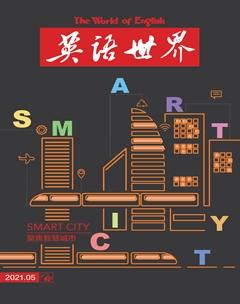How the World Uses Digital Twins to Solidify Smart City Development 數字孿生助力智慧城市建設
袁峰
A s the world becomes increasingly digital and data increases in value and volume, smart cities have grown to become a necessity.
This is primarily because smart cities are the answer to improved infrastructure, fast-tracked1 physical development, augmented operational efficiency and increased standards of living.
Smart solutions and advanced cap-abilities have allowed this to gradually happen but the real deal-maker2 here is the concept of digital twins, which enables a digital replica3 or “twin” of a city to be mapped on a single portal using all the data collected by internet of things (IoT) sensors.
It is an advanced capability that connects the physical world with the virtual world to provide real-time intelligence on urban landscapes and infrastructure via the IoT sensors.
As a result, it is able to create an interconnected information system that reflects the conditions, performance rate, and efficiency of a citys assets and operational systems. Of course, that also means that artificial intelligence (AI) capabilities and advanced analytics are at the core of this technology.
Smart cities around the world can be developed at scale efficiently thanks to this technology but the real highlight is how this technology has been leveraged in various ways to accelerate efforts and solve day-to-day urban-living challenges.
Asias smart city torchbearer: Singapore
This leading adopter of digital twin capabilities has managed to delight its citizens and stakeholders through a maturing Virtual Singapore project where a 3D digital twin of the city has been built to bolster management practices.
Using the technology, the country has managed to empower its research and development, virtual experimentation, decision-making, and test-bedding4 efforts.
For example, emergency situations in congested areas can be simulated to help authorities chart the most effective evacuation plans and safety protocols for the public to practice.
Paving the way to Europes smart city revolution: France
The French have been doing something similar but their goals are more directed towards bolstering architectural developments.
One of its cities, Rennes Metropole5, has also built a 3D model of itself to foolproof6 urban development efforts that take citizens needs and concerns into account.
The 3D models can also help developers, architects, and municipal authorities analyze the limitations or complications that follow construction projects.
Digital twins can also offer insights on how certain decisions could affect a citys landscape and infrastructure in the long run, saving cities from costly failures.
Breaking new ground in the nordic countries: Helsinki
Helsinki of Finland has got a different idea in mind though the 3D concept remains central. The city has leveraged digital twins to fortify its virtual tourism project and become a leading force in that space.
Coined as Virtual Helsinki, the city offers users the experience of “visiting” all its attraction spots at any time of the year using only virtual reality glasses and an app.
The citys digital twin is created in a high-quality 3D model which would allow a realistic touring experience for users and change the dynamics of the countrys tourism offerings.
Redefining urban living for India: Amaravati
Amaravati, the bold new $6.5 billion world-class smart city capital of the Indian state of Andhra Pradesh, is thought to be the first entire city born with a digital twin. The initial 3D prototype of the city was built using Cityzeniths Smart World Pro software7.
Covering 217km?, the project will have a 134km metro network, 316km of main roads, over 100 health centers and schools, 40 colleges, three universities, three key state government buildings, and the capacity to generate nearly 3GW of power. On completion, Amaravati will rank among the top three digitally advanced cities in the world.
Setting a new standard for digitally enabled urban sustainability: Newcastle
In the UK, post-graduate students from Newcastle University, working with Northumbrian Water, have created a digital twin of the city to help it better respond to incidents and disasters. The virtual model allows the water company to run computer-generated simulations of incidents such as burst pipes, heavy rainfall or serious flooding to demonstrate the impact it could have on peoples homes and communities over a 24-hour period in just minutes.
In an interview with the Guardian, Chris Kilsby, professor of hydrology and climate change in Newcastle Universitys School of Engineering, noted how valuable the technology would have been in a situation such as the 2012 “Toon monsoon” when a months rainfall fell in just two hours during rush hour and caused ?8 million worth of damage.
“The digital twin will not only allow the city to react in real time to such freak weather events, but also to test an infinite number of potential future emergencies,” said Kilsby.
“The Toon monsoon overwhelmed the drainage in the city because we just dont design for that sort of event. Theres not someone to blame but the city wasnt resilient.
“In a situation like that, a digital twin of the city would have been very useful. It tells us which buildings will be flooded, which infrastructure will be closed down, hospitals that could be affected. It gives us a picture immediately of which areas will be affected.”? ? ? ? ? ■
隨著世界日益數字化,數據價值提升、體量增大,建設智慧城市已勢在必行。
其主要原因是,智慧城市是改善基礎設施、加速硬件環境建設、提升運行效率和提高生活水平的鎖鑰。
智能解決方案和先進技術使智慧城市逐漸普及,但真正的決定性因素是數字孿生這一概念。數字孿生能利用物聯網傳感器采集的所有數據,將城市的數字化副本(亦即“孿生體”)映射到單一平臺上。
這一先進技術將實體世界與虛擬世界相連,通過物聯網傳感器提供關于城市景觀和基礎設施的實時信息。
這樣就能創建一個互聯互通的信息系統,反映城市的資產和運行體系的狀態、性能等級和效率。當然,這也意味著人工智能和高級分析是該技術的核心。
有了這項技術,世界各地可以大規模高效發展智慧城市,但真正的亮點在于,人們以各種方式利用該技術來加快行動、化解城市日常生活的各種挑戰。
亞洲智慧城市先驅:新加坡
新加坡率先采用數字孿生技術,其日臻成熟的“虛擬新加坡”項目令國民和利益相關方欣喜不已。該項目構建了新加坡的三維數字孿生體,為城市管理提供支持。
這項技術的應用使新加坡得以加強其研發、虛擬實驗、決策和試驗活動。
例如,可以模擬交通擁塞地區的緊急情況,幫助政府部門制定最有效的分流疏散方案和安全準則,供公眾遵行。
為歐洲智慧城市革命鋪平道路:法國
法國人一直在做類似的事,但他們的目標更側重于扶持建筑開發。
法國城市雷恩都會區也已建立該市的3D模型,以確保顧及市民需求和關切的各項城市開發舉措萬無一失。
3D模型還能幫助開發商、建筑師和市政當局分析建筑項目的后續局限性或新難題。
特定決策會如何長遠影響城市的景觀和基礎設施,對此,數字孿生技術也能使人洞燭機先,使城市避免代價高昂的失誤。
在北歐國家中開辟新天地:赫爾辛基
芬蘭的赫爾辛基另有主意,盡管3D概念仍為核心。該市利用數字孿生助推虛擬旅游項目,成為這一領域的領軍者。
該市為用戶提供名為“虛擬赫爾辛基”的體驗:只需使用虛擬現實眼鏡和一款應用程序,即可全年隨時“游覽”市內所有景點。
數字孿生體是在高質量的3D模型中創建的,可以為用戶提供逼真的游覽體驗,這將改變芬蘭旅游產品的發展態勢。
重新定義印度的城市生活:阿馬拉瓦蒂
印度安得拉邦新首府阿馬拉瓦蒂是一座耗資65億美元大手筆興建的世界級智慧城市,被視為首個問世之初即配有全域數字孿生體的城市。該市的初始三維原型是運用Cityzenith公司的Smart World Pro軟件構建的。
該項目占地217平方公里,將擁有134公里長的地鐵網絡、316公里長的主干道路、100多個醫療中心和中小學、40所學院、3所大學、3座重要的邦政府大樓,以及將近3吉瓦的發電容量。項目竣工后,阿馬拉瓦蒂將躋身全球三大數字化先進城市之列。
為數字化城市可持續發展設定新標準:紐卡斯爾
在英國,來自紐卡斯爾大學的一群研究生與諾森比亞水務公司合作創建了紐卡斯爾的數字孿生體,以幫助該市更好地應對事故和災難。水務公司可運用虛擬模型對管道爆裂、暴雨或嚴重洪澇等事件進行計算機生成模擬,短短幾分鐘即可演示出此類事件在事發24小時之內可能給民居和社區帶來的影響。
在接受英國《衛報》采訪時,紐卡斯爾大學工程學院從事水文與氣候變化研究的教授克里斯·基爾斯比指出,在2012年“圖恩季風”這樣的天氣狀況下,這項技術會發揮極大作用。當時,在交通高峰時間,通常一個月的降雨量在短短兩小時內傾瀉而下,造成價值800萬英鎊的損失。
基爾斯比說:“數字孿生體不僅可以讓城市對此類異常氣象事件做出實時反應,還可讓城市測試未來可能發生的不計其數的緊急情況。”
“圖恩季風使城市排水系統不堪重負,因為我們的設計根本就沒考慮防范此類事件。沒法怪罪任何人,在當時,這座城市不具抗災韌性。
“在當時那種情況下,城市的數字孿生體會非常有用。它告訴我們哪些建筑將遭水淹,哪些基礎設施會被關閉,哪些醫院或受影響,讓我們即時了解哪些區域會受災。”? ? ? □
(譯者為“《英語世界》杯”翻譯大賽獲獎者)
1 fast-track加速……的進程。? 2 deal-maker本義為“促成交易的關鍵人物”,此處喻指“成功的決定性因素”。? ? 3 replica復制品。
4 test-bed試驗,測試。
5由法國西北部城市雷恩及其周邊42個市鎮所組成的一個市鎮公共合作組織,是法國22個“都會區”之一。其前身為1960年成立的“雷恩地區”(Rennes District)。? 6 foolproof確保安全。
7 Cityzenith是美國頂尖智慧城市軟件公司,其聯合創始人之一曾參與創建了“谷歌地球”。Smart World Pro是一個數字孿生軟件平臺,可訪問超過10億個經過地理標記的地理標記數據層。

